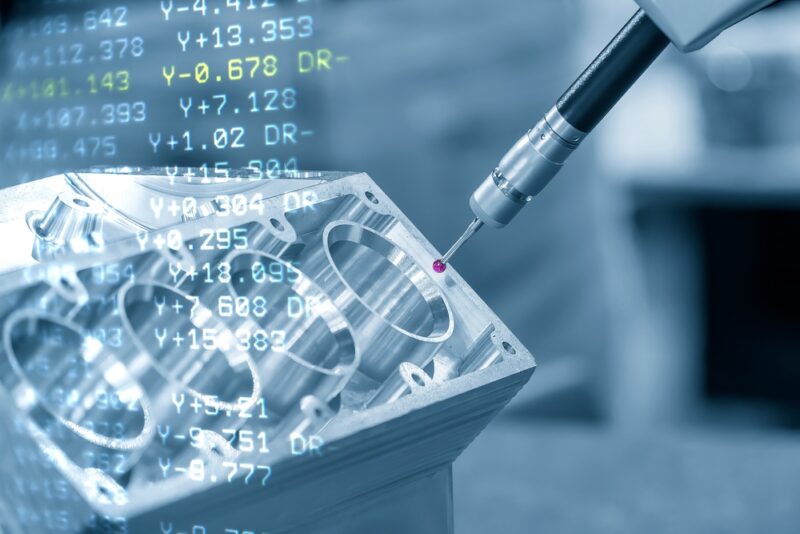Precision Measurement Services Guide: Popular Solutions
Hitting the mark or bullseye of something means more than a cliché. Precision measurement services can help organizations achieve the highest standards of accuracy and quality in manufacturing. These services encompass techniques like CMM programming, inspection fixture design, and first article inspections, which enable components to meet stringent specifications. The importance spans various industries, from automotive to aerospace. Even minor deviations can lead to large functional failures, so measurement and inspection methods act as guardians of integrity, safety, and performance.
If you need precision measurement services from a knowledgeable and dedicated industry leader, contact QES Solutions in Rochester, NY, today.
Measurement & Inspection Services
CMM Programming
Coordinate Measuring Machine (CMM) programming is a sophisticated method used to precisely measure the geometry of physical objects. By using a probe that touches the surface of the object, CMM machines collect data points that are important in the creation of detailed 3D models. The benefits of CMM Programming include high precision, repeatability, and the ability to inspect complex parts and assemblies effectively. Custom CMM programming solutions allow for tailored inspections that meet specific industry standards and project requirements, enhancing product quality and reducing manufacturing errors.
Inspection Fixtures & Consulting
Custom inspection fixtures are designed to securely hold a part or assembly under inspection. By ensuring proper alignment and stabilization, these fixtures improve the accuracy of the measurement process. Additionally, consulting services in inspection processes can help optimize quality control, enhance efficiency, and reduce the risk of product non-conformity. These services involve analyzing existing inspection methods and recommending improvements, which are important for maintaining competitiveness and compliance in fast-paced manufacturing environments.
Quality Control Processes
First Article Inspection (FAI)
First Article Inspection (FAI) plays a pivotal role in making sure that a component or assembly meets the required design specifications and industry standards before full-scale production begins. The FAI process involves a detailed examination of every aspect of the first production unit, comparing it against the design drawings and specifications to identify any deviations. This can ensure that manufacturing processes produce parts consistently to the highest quality standards. Compliance with industry standards like AS9100 in aerospace or ISO 13485 for medical devices signifies a commitment to producing safe, reliable products.
Process Qualification
Process Qualification is the systematic approach to confirming that manufacturing processes produce output that consistently meets predetermined quality criteria. The steps for quality assurance include process design, process qualification, and continued process verification. Together, such steps can make sure that each product batch meets established specifications.
Production Part Approval Process (PPAP)
The Production Part Approval Process (PPAP) is a comprehensive procedure used in the automotive and other manufacturing industries to help ensure that components and assemblies meet the client’s specifications and quality standards. PPAP requirements include sample parts, dimensional data, material and performance test results, process control plans, and more. It verifies that suppliers can meet demand while meeting quality benchmarks, reducing the risk of product non-conformity and customer dissatisfaction.
Specialized Measurement Studies
Injection Mold Studies
Injection mold studies are crucial in product design, particularly in industries like automotive and consumer electronics, where precision and scalability are paramount. These studies involve analyzing the mold’s ability to produce parts that meet design requirements consistently. The process includes evaluating the mold design, the injected materials, and the final product characteristics. The outcomes help in refining mold design, strengthening product quality, and reducing waste and production costs.
Surface Roughness Testing
Surface roughness testing is key to evaluating product functionality and aesthetics in a variety of industries, such as aerospace and healthcare, in which surface finish can impact performance and safety. Testing methodologies include tactile probes and non-contact methods such as laser scanning and white light interferometry. These tests measure the texture of a surface and identify deviations from smoothness, which can influence the material’s friction, wear resistance, and visual appeal.
Reverse Engineering
Definition & Applications
Reverse engineering is when a finished product is deconstructed to reveal its designs, architecture, or to extract knowledge about its components and functioning. This technique is widely applied in industries such as automotive, aerospace, electronics, and software development, where understanding competitor products or legacy parts without original blueprints is nearly essential.
Benefits to Innovation & Product Development
The benefits of reverse engineering extend significantly into innovation and product development. It allows companies to analyze products in the market to improve their own designs or to overcome patents, fostering innovation through improved functionality or cost-efficiency. It also plays a critical role in reproducing obsolete parts, ensuring the longevity of older equipment without the need for original manufacturing resources. By understanding and utilizing existing designs as a baseline, companies can accelerate the development process, reduce research and development costs, and introduce turnaround solutions that meet evolving market demands more effectively.
QES Solutions: Dependable Experience in Precision Measurement
In this article, we have explored various precision measurement services — from First Article Inspection to specialized studies like surface roughness testing. Tapping into these solutions can greatly benefit manufacturing quality and consistency, allowing products to meet strict standards and customer expectations. By integrating advanced measurement services, manufacturers can achieve superior product quality and consistency in virtually every batch.
Explore precision measurement services from QES Solutions today and elevate your manufacturing quality with a trusted partner by your side.

